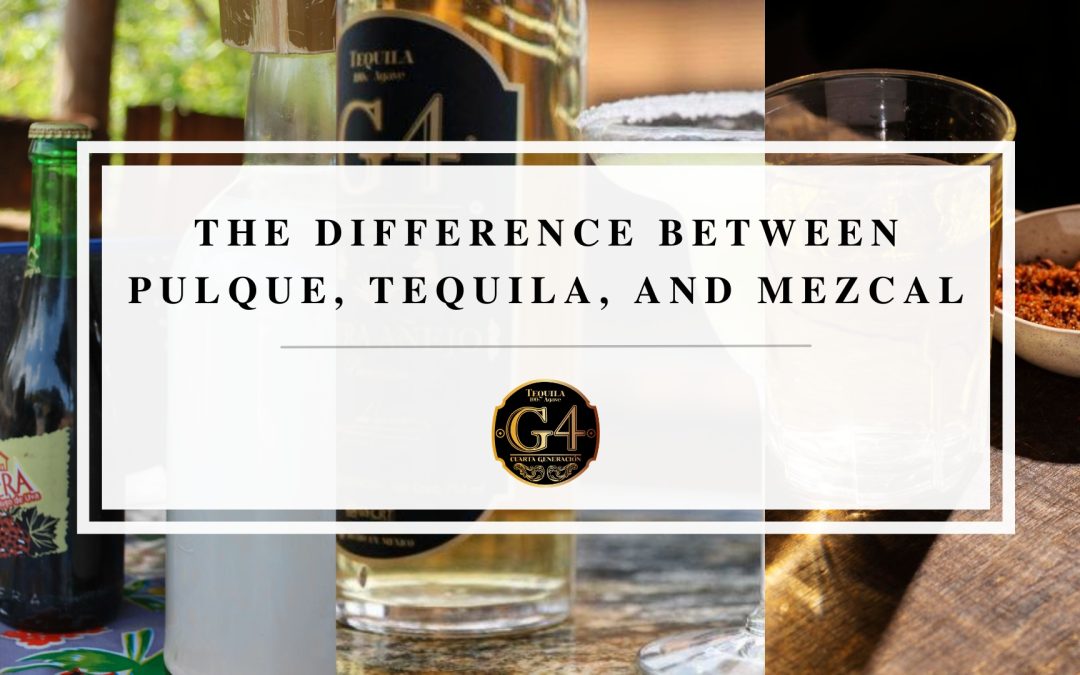The agave plant, with its spiky leaves and imposing stature, holds a deep-rooted place in Mexican history and culture. Its fibers provided everything from clothing to construction materials in ancient times. But perhaps its most famous role lies in the production of beloved alcoholic beverages, including tequila, a world-renowned spirit.
- Pulque: The Ancient Agave Beverage
- The Arrival of Distillation and the Birth of Mezcal
- Tequila: A Mezcal with a Specific Origin
- When Choosing the Best; Choose G4 Tequila
However, there’s often confusion surrounding agave-based beverages. The terms pulque, tequila, and mezcal are sometimes used interchangeably, which creates a misconception. Let’s explore the tequila history and distinct characteristics of these drinks to help you understand what truly sets them apart.
Pulque: The Ancient Agave Beverage
Pulque, the ancestor of tequila and mezcal, traces its origins back to the pre-Columbian civilizations of Mesoamerica. The Aztecs, among other indigenous peoples, discovered that the heart of certain agave plants contained a sweet sap called aguamiel, or honey water. When allowed to ferment, aguamiel transforms into pulque.
More than just a drink, pulque held religious significance. People believed pulque possessed divine qualities, a drink fit for gods and goddesses, so it was often used in rituals and ceremonies as an offering. It was also considered a nourishing drink for the elderly, new mothers, and those recovering from illness.
So, how exactly was pulque made? Traditionally, a skilled harvester known as tlachiquero would carefully extract the aguamiel from the agave’s heart, or piña. The aguamiel was then placed in large containers and left to ferment naturally, thanks to the ambient yeasts present in the environment. The result was pulque – a mildly alcoholic, tangy, and slightly effervescent drink.
The Arrival of Distillation and the Birth of Mezcal
The arrival of the Spanish in the 16th century marked a turning point in the history of agave beverages. Distillation, a process that would concentrate the alcohol from fermented aguamiel, was introduced, leading to an entirely new type of spirit. The distilled agave spirit became known as mezcal.
The word “mezcal” stems from Nahuatl, an Aztec language, and means “oven-cooked agave.” Unlike pulque, mezcal production involves cooking the piña to convert its starches into fermentable sugars. The cooked piña is then crushed, fermented, and distilled, resulting in a spirit with greater strength and a unique flavor profile.
Furthermore, mezcal isn’t limited to just one agave type. Across Mexico, various regions utilize different species of agave, each imparting its own distinct characteristics to the final spirit. The diversity of agave varieties contributes to mezcal’s incredible range of flavors, from smoky and earthy to fruity and floral.
Tequila: A Mezcal with a Specific Origin
Think of tequila as a specialized type of mezcal. It shares the same distilled agave spirit roots but adheres to strict regulations. Tequila production is geographically limited to Jalisco, Mexico, and other specific tequila regions, including Nayarit, Michoacán, Guanajuato, and Tamaulipas. And to bear the name “tequila,” the spirit must be crafted exclusively from the blue agave plant, known for its sweeter flavor profile.
So, how did tequila become the internationally acclaimed agave spirit it is today? Several factors came into play, including:
-
- Versatility. The smooth, approachable flavor profile of tequila offers endless possibilities for exploration and enjoyment.
- Regulation. The establishment of rules and standards around tequila production helped assure consumers of consistent quality.
- Marketing. Savvy marketing campaigns and associations with celebrities further solidified tequila’s appeal.
It’s important to note that not all tequilas are created equal. Most mass-produced popular brands contain additives and sweeteners that alter the taste profile. These tequilas do not reflect the true essence of the spirit.
For a truly authentic tequila experience, look for brands listed as Verified Additive Free by Tequila Matchmaker or, hopefully soon, by the CRT’s own Additive Free endorsement, ensuring your tequila is without any added sugars or flavorings. G4 Tequila, for example, is an authentic, transparent, producer-owned tequila crafted using time-honored methods and high-quality blue agave, offering a taste of the spirit in its purest form.
When Choosing the Best; Choose G4 Tequila
When choosing the perfect tequila that truly embodies tradition and craftsmanship, look no further than G4 Tequila. Our commitment to using 100% estate-grown blue agave and meticulous production methods, preserving time-tested techniques while innovating for a modern audience, shines through in each sip.
Get your hands on a bottle today and experience the difference for yourself! Explore our wide range of tequila selections, from our bright and vibrant Blanco to the rich complexity of our aged Añejo and Extra Añejo expressions, offering a taste experience like no other. Discover why G4 is a favorite among aficionados who appreciate authenticity and quality.
To find G4 Tequila near you, use our convenient store locator tool. If you have any questions or need assistance, don’t hesitate to reach out to us at (312) 796-6483 or here.

